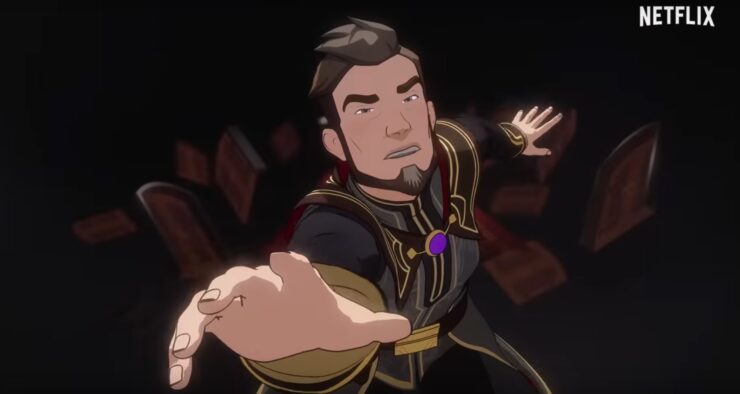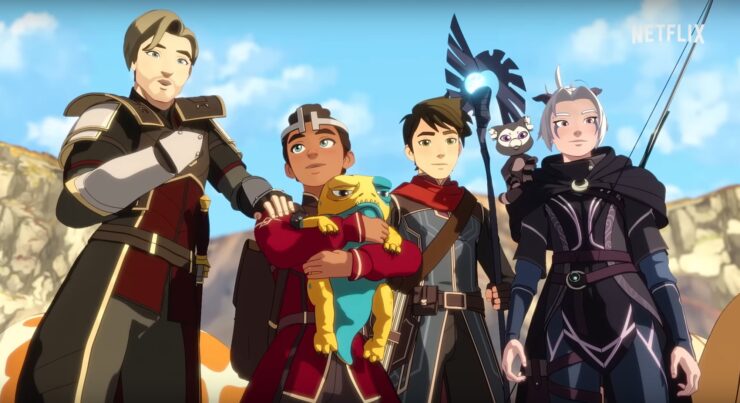After the expected pandemic-related slowdowns, The Dragon Prince has been back with a vengeance—no, sorry, a vengeance isn’t really the feeling, more like zeal, cleverness, and deep enthusiasm—getting seasons four and five to fans in quick succession. Part two of the “Mystery of Aaravos” arc, season five picks up with a ticking clock concerning the release of the eponymous Startouch elf in question, and continues apace at breakneck speed. But the notable shift of the fifth season has less to do with Aaravos himself than with a tonal push into the realm of horror.
Things are about to get creepy for our Xadian friends.
[Minor spoilers for The Dragon Prince.]
This season zeroes in on the race to free Aaravos (Erik Todd Dellums), the only desire of dark mage Claudia (Racquel Belmonte), who is desperate to keep her father Viren (Jason Simpson) alive after using a spell to resurrect him that only lasts for one month. Aided by her adoring boyfriend, an Earthblood Elf named Terrestrius (Benjamin Callins) and a mysterious homunculus grown from a caterpillar sent to Viren by Aaravos, the group hurries to the believed location of the Startouch Elf’s prison. Young King Ezran (Sasha Rojen), his brother High Mage Callum (Jack De Sena) and Moonshadow Elf Rayla (Paula Burrows) are hard at work trying to beat them to it, with the help of Viren’s son, Soren (Jesse Inocalla), and Corvus (Omari Newton).
The season begins with a reaffirmation of trust and respect between Callum and Rayla, who rekindled their relationship in season four after a separation that hurt both of them. Having made the choice to continue, Callum has the chance to let suspicion rule him and levy his power as High Mage against Rayla, when she’s discovered sneaking about the Katolis castle. Callum refuses, cementing a theme of trust and disclosure that runs throughout the season; many of the actions we see are largely dependent on who is given trust, who loses it, why people chose to hide things from the people they do trust, how a lack of trust creates fissures and stresses between people who desire a closeness that they cannot achieve.
One such character is Viren, perhaps the show’s most tragic antagonist. A nightmare sequence in episode three begins to give us more clues as to what triggered Viren’s path toward dark magic, but he ultimately leaves us with more questions than answers. We do get a different view on his final interaction with King Harrow (Luc Roderique), a clarity of intention that, while expected, is nonetheless heartbreaking to witness. By the end of the season, Viren’s fate seems sealed… but, of course, we can hardly trust that things will stay the same by the time season six rolls around.

Callum’s journey here is also important, as he continues to learn about primal magic, focusing on the ocean arcanum this time around. But there’s always the question of whether Callum will turn to the use of dark magic in a bind, as he did in the previous season. This juxtaposes him perfectly with Claudia, who is already deep down the dark magic well, following her father’s footsteps. Interestingly, both Callum and Claudia have elf partners who believe in them and their ability to do good, but it’s that finicky lack of disclosure, of honesty, that may prove to be the undoing of both mages. And Claudia is also, of course, shown in opposition to her brother Soren, who has managed to free himself of their family’s abusive dynamic. Watching Soren put words to those feelings—and it’s hard for him, since he’s not exactly a thoughtful or eloquent guy—is far and away one of the most moving points of the season.
Buy the Book


The Water Outlaws
There are always a few odd logic gaps in plots such as these, and though they are ultimately mild quibbles, it always strikes me as strange that they make it through. Specifically, there is a secret that Ezran learns early in the season from Domina Profundis (Jennifer Hale), Archdragon of the Ocean, that would prevent Claudia from success. You would expect everyone to stay home at that point—if Claudia never gets that piece of information, and Ezran isn’t there putting it to use, wouldn’t she fail and then conceivably give up after losing her father? If everyone is working under the assumption that their counterparts on the other side will somehow learn everything that they know, someone could at least say so. Otherwise it seems as though our heroes are potentially causing the problems they are trying to avoid.
One of the enjoyable facets of longer-running series is the ability to experiment with different tones and styles of storytelling, something that’s frankly missing from the majority of television in recent years. While The Dragon Prince hasn’t attempted a shift quite this pronounced before, the change jives incredibly well with the story for this season, particularly as characters find out what Viren’s corruption of the Sunforge at Lux Aurea has wrought for the region, resulting in monstrosities that can corrupt anything that they wound. This is one of several ways that horror comes into play during season five, and it gives the arc an ominous overtone that drives the action forward, even while the show’s signature sense of humor continues to lighten the mood where needed.
Another way that horror weaves itself into this season is through specific homages to other shows and films, some that have been a long time coming. Adults watching the show might have noticed that the “dark magic speak” we hear Claudia and Viren using sounds very similar to the jumbled samplings in Twin Peaks’ dream realm, but this season sees a fully rendered parody sequence, complete with red curtains, sway dancing, and a woman carrying a log. There are many other sequences that nod to classic scenes in the genre, but those aren’t the only points where you’ll find nods to beloved stories—there’s a fantastic Deep Space Nine reference halfway through the season that I’m so excited for other folks to catch.
Ultimately, The Dragon Prince has managed to juggle a sprawling cast, an ever-expanding world mythology, a tonal tightrope act, and all the character development needed to keep us moving toward the next season. When it comes to fantasy television available right now, there’s very little that’s matching it in terms of satisfaction and enjoyment. It’s important to have the reminder that even when a show goes “dark” it doesn’t have to mean grayscale and drudgery and maxed-out drama every second—sometimes creepy and sinister is all you need to truly stand out. Here’s hoping that season six isn’t far behind.
Emmet Asher-Perrin needs everyone to catch the DS9 reference, though. They shrieked at the television when they heard it. You can bug them on Twitter and read more of their work here and elsewhere.










